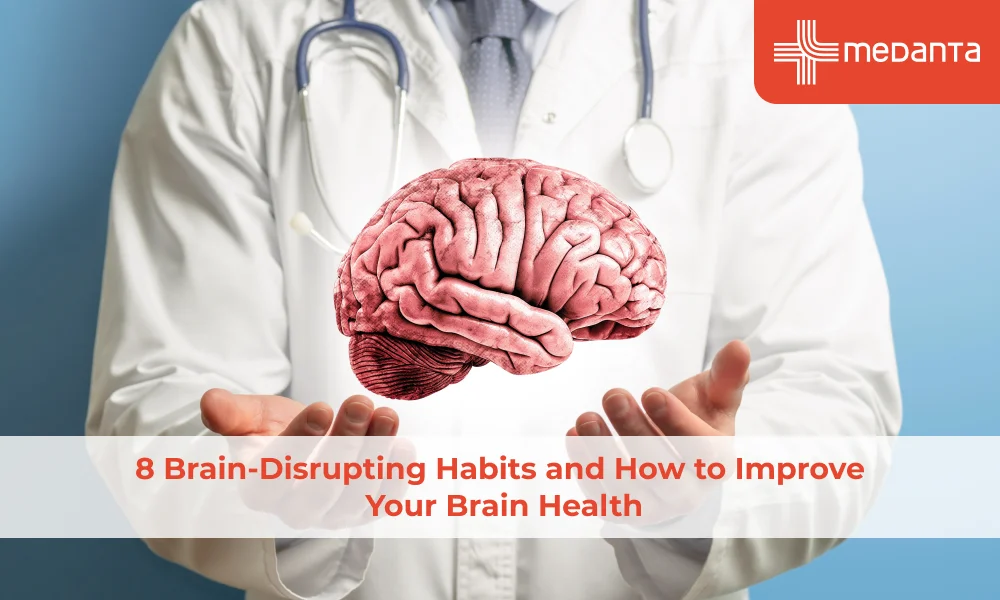8 Brain-Disrupting Habits and How to Improve Your Brain Health

TABLE OF CONTENTS
We are all aware that our daily activities have an impact on our physical health. However, it has an impact on our brain as well. Whatever we do, hear, or respond to have a direct and indirect influence on the brain. Because certain of our actions can harm the brain, it is critical to identify and change these brain-disrupting habits. Changing just one of these habits could have a significant impact on how your brain functions, allowing you to age more healthily and effectively.
You have unhealthy sleep habits
Sleep is necessary to rest your body and mind so that they can be restored quickly. It relieves stress while repairing cellular damage and restoring energy levels. So get enough sleep on a regular basis. If you're having difficulties sleeping, avoid alcohol, coffee, and electronic devices in the evening.
You focus on negative thinking
Some people have an unduly strong reaction to minor issues. Tension and rage develop as a result of this. When you do this, the blood supply to the brain decreases and the arteries harden, causing the brain's function to deteriorate. Take a few deep belly breaths, try a different task, or shift your attention to anything in your immediate surroundings.
You don’t drink enough water
90% of our brain is made out of water. If you sit in the air conditioning for a long time without drinking water, your cells will shrink. Water not only keeps our bodies hydrated, but it also keeps our minds healthy. So, during the day, drink plenty of water.
You have an inactive lifestyle
Sedentary activity is defined as any waking behavior with an energy expenditure of 1.5 metabolic equivalent task, such as sitting or leaning (MET). If you're at home, in front of the television, or at work, in front of the computer, this behavior is bad for your physical health. It also has an impact on one's health. The more inactive you are, the more anxiety, depression, and other unpleasant impacts you will experience. As a result, it is recommended that you exercise every day. Give time in sports. Every now and then, get out of your chair.
You are addicted to your cell phone
If one's eyes are glued to the phone from morning to night, it can harm the brain. Overuse of cell phones has been linked to anxiety and sadness, according to research.
You are lacking natural light
When you spend the most of your time at home, you do not receive enough natural light. As a result, you may become depressed. It might also make your mind feel sluggish. On the other hand, loneliness can lead to tension and sadness.
You listen to music on high volume
According to neuroscientists, prolonged exposure to high noise changes how the brain interprets speech, potentially making it very difficult to identify speech sounds. The hair cells in the ear, which operate as sound receptors, are permanently damaged when they are exposed to extremely loud sounds.
You ignore your health
Poor control of blood pressure, blood sugar, cardiac illness, smoking and consuming excess alcohol are harmful for the brain.

Ways to Improve Your Brain Health
According to studies, participating in sports increases blood flow to the brain. This helps your brain build stronger problem-solving skills, boosts memory, and increases creativity.
Try to use headphones as little as possible. Even if you do, keep the volume at a minimum.
Try learning new things, when you learn something new, you're exercising your brain, which can help you enhance cognitive abilities like concentration, attention to detail, memory recall, and problem solving, as well as lower your risk of dementia.
Practicing yoga or mindfulness meditation can improve executive functions, cognitive capacities associated to goal-directed conduct, and the ability to manage habitual thinking patterns, and actions.
A daily morning stroll has been shown to be beneficial to brain function. Laughter is beneficial to the brain, mind, and body. Hobbies like ainting, gardening, cooking, singing, and dancing can sharpen brain functions and are also beneficial in the treatment of depression.
It’s time to take charge of your brain health, if you have any questions related to improving your brain health, consult Medanta doctors.






